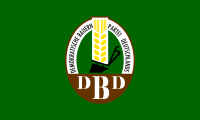Democratic Farmers' Party of Germany
|
Democratic Farmers' Party of Germany
Demokratische Bauernpartei Deutschlands |
|
|---|---|
| Chairman |
Ernst Goldenbaum (1948–82) Ernst Mecklenburg (1982–87) Günther Maleuda (1987–90) Ulrich Junghanns (1990) |
| Founded | 17 June 1948 |
| Dissolved | 15 September 1990 |
| Merged into | CDU |
| Headquarters | East Berlin, East Germany |
| Newspaper | Bauernecho |
| Membership (1988) | 122,000 |
| Ideology |
1948-1989: Agrarianism Socialism 1989-1990: Agrarianism Social democracy |
| Political position |
1948-1989: Left-wing 1989-1990: Center left |
| National affiliation | National Front (1950–90) |
| International affiliation | None; but retained contacts with the other agrarian parties in the Soviet dominated part of the world and Scandinavian agrarian parties |
| Colours | Green |
| Party flag | |
 |
|
The Democratic Farmers' Party of Germany (German: Demokratische Bauernpartei Deutschlands, DBD) was an East German political party. The DBD was founded in 1948. It had 52 representatives in the Volkskammer, as part of the National Front. The DBD participated in all GDR cabinets (with exception of the last GDR cabinet). According to DBD Deutsche Bauernpartei from chronik der wende the founding of the DBD was an attempt by the SED to weaken the influence of CDU/LDPD in the rural community by establishing a party loyal to the SED. The leadership cadre came mainly from the ranks of the SED. In the late 1980s, the party had 117,000 members.
After the fall of Berlin Wall, the party initially tried to find itself a niche as ecological agrarian party, but the first free Volkskammer election (1990) netted it only nine seats. In 1990 the DBD merged with the Christian Democratic Union.
The DBD had friendly relations with peasants' parties in other Eastern Bloc countries. It had close contacts with the Polish United People's Party (Zjednoczone Stronnictwo Ludowe, ZSL) and the Bulgarian Agrarian National Union (Bǔlgarski Zemedelski Naroden Sǔyuz, BZNS). Besides that, there were some contacts with farmers' associations in West Germany. They had also some contacts with agrarian parties in Finland (Centre Party) and in Sweden (Centre Party).
...
Wikipedia
